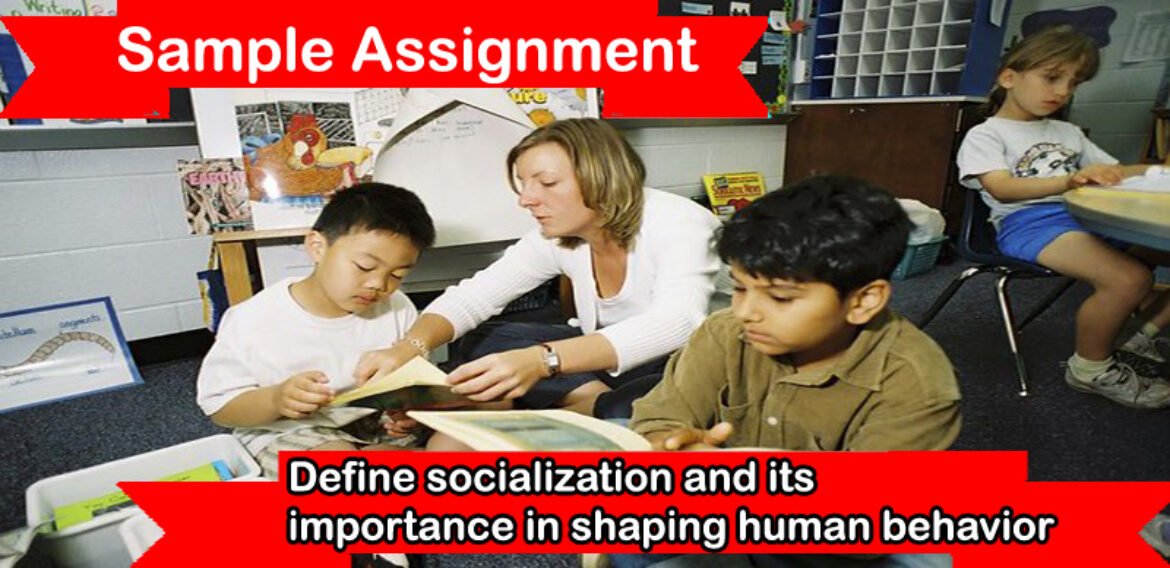Define socialization and its importance in shaping human behavior
Introduction
In the socialization process the person is exposed to many experiences of relationships with others and learns to evaluate himself and construct a self-image. This process of socialization shapes the human behavior and is called personification.
As the child matures, he learns increased skills in manipulating his parents: he gains inability to appeal to authorities of the outside world and thus to bring pressure to bear upon the parents on behalf of society. The growing child is able to confront his parents in a show down of physical and social power (Wheller, 1966).
In school, teachers extend socialization process by grouping individuals at about the same competence level. The teachers’ aim is to overlap and reinforce parental efforts for socialization (John, 1968). School provides the socialization in developing peer relationships. Peers act as socializing agents by exerting and accepting influence on an individual. Until this time, parents acted as primary influence on their children. This influence decreases as the child becomes involved with his peers. The child does not throw off his parents values and identity but merely becomes more open to new experiences in socialized behavior (John, 1968).By adolescence, the individual is more involved in defining his goals and choosing experiences to achieve them.
Development of human behavior
There is a strong desire to be the “good-me” which is another way of expressing the undesirability of experiencing anxiety. It is the function of the self-system to attempt to always be the “good-me”, and from this there may be “disastrous distortions which will manifest themselves, barring very fortunate experience, in the whole subsequent development of personality” (Sullivan, 1953, p.170). If the self-system must be expansive for protection then it is a dominant factor of personality. The self-system is “The stumbling block to favorable changes in personality (Sullivan, 1953, p.170).
Just as Sullivan observed interpersonal relationships as very important to the development of human behavior, Horney also does and she was able to articulate these aspects in terms of neurotic development.
Karen Horney respected Freud but wanted to push beyond his revealing discoveries. She felt he had over-emphasized the biological affect on mental characteristics and under-emphasized the social factors. “Freud’s disregard of cultural factors not only leads to false generalizations, but to a large extent blocks an understanding of the real forces which motivate our attitudes and action” (Homey, 1937, p. 20).
There are existing similarities of peculiar behavior in neurotic individuals which are produced by the cultural forces resulting from the difficulties of our times (Homey, 1937, p. 34). This may be discovered as we observe the attitudes of those around us. These attitudes include: “First, attitudes concerning giving and getting affections; Second, attitudes concerning evaluation of the self; Third, attitudes concerning self-assertion; Fourth, aggression; Fifth, sexuality (Homey, 1937, p. 48). Neurotic behavior of the first attitude shows up as an indiscriminate hunger for affection or appreciation from people, whether significant or not. The second shows up as inner insecurity and feelings of inadequacy expressed as stupidity, ugliness, incompetence, or other depletion whether there is basis for it or not. The third reveals itself as inhibition in expressing their stand, desires, wishes, opinions, etc. The fourth is observed in behavior of domination, aggressiveness, cheating, humiliating or scolding. The fifth shows up as inhibitions toward sexual activities. Horney suggests the underlying psychological difficulty is a conflict. She states it as a basic conflict which is “the fundamentally contradictory attitudes he has acquired toward other persons (Horney, 1945, p.40). Preceding the basic conflict is basic anxiety, “meaning by this the feeling a child has of being isolated and helpless in a potentially hostile world.
Kurt Lewin Field Theory of Socialization
Lewin’s approach to personality was the field theory wherein a field is defined as “The totality of coexisting facts which are conceived of as mutually interdependent” (Lewin, 1951, p. 240). He saw psychology’s need to “be broad enough to be applicable to the most primitive bodily behavior as well as to the emotions, thought processes, values, and social relationships. It must be capable of representing these processes not as single isolated facts but in their mutual dependence as expressions of a concrete situation involving a definite person in a definite condition. These concepts must unify without undue simplification; they must include both person and environment, both law and individual case (p. 6).
According to field theory behavior depends neither on the past nor on the future- but on the present field which is the life space of the individual containing both the person and the social environment as he is experiencing it. The social environment of the individual must be described in any given instance if his behavior is to be understood.
There are certain aspects of the life space that affect human behavior. When one is attracted to something, the something has positive valence which means it may satisfy his needs. This attraction is a psychological force or vector toward the object. He may be repulsed by a rector moving him away from the object which then has negative valance. If the object is not in the field it has no valence. His behavior may be the resultant of two or more vectors operative in the situation, harriers are conditions hindering locomotion and may have negative valence. If a barrier is great enough there may be resultant regressive behavior, and sometimes the barrier enhances positive valence as the grass looks greener on the other side.
Goldstein (1939) observes the human behavior as a whole according to organismic theory, and not as a group of isolated or differentiated parts. Only under unusual or pathological conditions does the organism function segmentally rather than as an integrated unit. What affects one part of the human being affects the whole being. Emotions, intellect and physical are not parts but a whole (p. 305).
Related work: Crime and Deviance: Evaluating 2 Major Sociological Theories of Crime
For Goldstein man meets his social environment in a way to constantly maintain himself and go even beyond maintenance toward the actualization of his potentials. His term self-actualization is important that it moves man to a greater degree of completeness and fulfillment. “One of the outstanding events in psychology of the present century has been the discovery of personality. Personality, whatever else it may be, is the substantial, concrete unit of mental life that exists in forms that are definitely single and individual. Allport, 1960, p. 5).
Personality is the dynamic organization within the individual of those psychophysical systems that determine his unique adjustments to his social environment”(p. 48). When personality has value-judgments placed upon it, it takes on the nature of character. The person’s qualities are simply what they are but are evaluated as character. Personality includes establishments such as knowledge, value systems, and goals and processes such as perception, emotion, and intention, and not only may it be influenced by its social environment but also by happenings in other parts of the body than the brain. Generally the functions of the personality are “to exercise its processes, to express itself, to learn to generate and reduce insistent need-tensions, to form serial programs for the attainment of distant goals, and, finally, to lessen or resolve conflicts bi forming schedules which more nearly permit the frictionless appeasement of its major needs (Kluckhohn, 1953, p. 39).
Human Behavior Development
Freud (1966) saw human behavior development as psychosexual that included several stages. The first stage, the oral stage, is when the baby’s mouth is the most prominent source of both his tension reduction, such as eating, and his pleasurable sensations, such as sucking (Freud, 1966, p. 256). The second stage, the anal stage, begins about the second year with the libido shifting from the mouth to the anus. Pleasure is derived first from expelling feces and later from retaining them. Parental demands are made concerning toilet training and the child may respond in different ways. If he can respond to the demands he will learn self-control. If he controls parents by defecating at a difficult time for convenience he will develop a hostile-aggressive aspect of character. If he controls parents by retention of the feces he will develop a stingy, stubborn and hoarding aspect of character.
During the fourth and fifth years of life the libido is centered around the genital region, which is called phallic stage. Children at this time examine genitalia and masturbate. They go through the Oedipus complex where they fall in love with and wish to possess the opposite sexed parent. For the girl penis envy must be suffered and the boy must suffer castration anxiety. Each child should go through the process of identifying with the same-sexed parent for proper development of human behavior.
The fourth stage is the latency period extending to puberty. The libido is dormant as to sexual drives and concerns itself with school, friends, hobbies and the like (Spiegler, 1970, p. 48).
The last stage is called the genital stage and lasts until senility. Heterosexual pleasure is the aim of the libido, and if the first three stages were not disastrous to the libido successful adjustment is made. Emotional distress of the adult comes from large amounts of the libido being fixated at one or more of the first three stages. Normal people escape these fixations.
How socialization determine individual roles
Human behavior includes the concepts of role from social psychology and anthropology which encompasses the dynamic process of man’s behavior, and involves the interplay between intra-individual and extra-individual factors that determine its complexity. Intra-individual factors are subsumed in the concept of personal causation which is an expanded non-reductionist view originating in the field of psychology. Extra individual factors are explained according to the concept of socialization as established within the field of sociology.
Role theory “attempts to conceptualize human conduct at a relatively complex level”(Theodore, 1968).Variables from culture, society and personality are viewed. Role is utilized as “a unit of culture” with self representing the “unit of personality” and position, the “unit of society” (Edward, 1966). Role theory is presented by Theodore Sarbin as “a unique socio-psych formulation” (Theodore, 1966).
Sociologists focus on extra-individual determinants of role, psychologists stress intra-individual factors (James, 1969). Role encompasses a “dynamic process that involves an interplay between both sets of determinants” (Vernon, 1970, p. 45).
Not traceable to Freud and Lewin as “most psycho analytic and field theoretical schools, “role theory developed from independent investigators who “discovered” the need for “synoptic concepts of role, self and interaction”(John, 1968, p. 34).
The concept of self was first placed on empirical footing by Baldwin, Hall, James and Dewey at the turn of the century. Cooley and Mead further developed the notion of self and analyzed the role-taking process. Role theory seemed to disappear from learned psychology until Allportin (1937) emphasized the term. Until recently, role theory was “for the most part an armchair abstraction that had little impression on American psychological thought”(Gordon, 1939).
Conclusion
The above discussion highlights the importance of socialization in shaping the human behavior. An individual begins the self esteem process from his parents and then his behavior is influenced by his interaction with his peers and teachers at school. A school is the best place for individuals to socialize and learn how to behave and interact. The culmination process of socialization is the workplace that enhances personal traits which help an individual to become more responsible, civilized and socialized. Hence, the society in which an individual lives in has a great impact on shaping and influencing human behavior. Occupational behavior includes the concepts of role from social psychology and anthropology which encompasses the dynamic process of man’s behavior, and involves the interplay between intra-individual and extra-individual factors that determine its complexity.
Need Help in writing a sociology assignment, coursework or dissertation? Order Now with confidence and guaranteed 100% satisfaction





